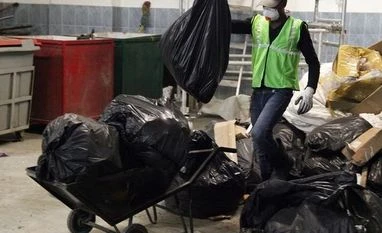As a new business in India offering environmentally-friendly rubbish disposal, ScrapApp has boomed in the past year while helping address one of the nation's major problems - garbage.
In India, where recycling rubbish is not part of the formal sector, masked workers from social enterprise ScrapApp sift through mounds of rubbish daily at India's largest mall, DLF Mall of India, separating recyclable trash from other waste.
The mall contract is the jewel in the crown for the year-old start-up, one of a growing number of social enterprises in India which are seeking funds to create businesses with a mission to tackle social problems.
A Thomson Reuters Foundation poll of nearly 900 experts on the best countries for social entrepreneurs found access to investment was one of the key challenges in the growing sector.
But India was one of the countries where it was easiest to access investment, coming behind Canada, Singapore, the United States, and Belgium.
ScrapApp's CEO Vidhur Bakshi, 27, said overseas may be the best place to seek funds to have an impact in India where one-third of the 1.3 billion population live below the poverty line and garbage pollutes streets and rivers and spreads disease.
Also Read
"There are sources of funding within India, but it is not easy, most people want a quick return," said Bakshi, who started ScrapApp in September 2015 with three colleagues.
"There are a lot possibilities if we explore sources of finance overseas."
The poll, carried out in partnership with Deutsche Bank, the Global Social Entrepreneurship Network (GSEN) and UnLtd, foundations for social entrepreneurs, surveyed social entrepreneurs, academics investors and support agencies in the world's 45 biggest economies as ranked by the World Bank.
The survey found the difficulty in accessing funds was compounded by a lack of public awareness about the work of social entrepreneurs who can run for-profit or non-profit businesses which try to drive social change.
OVERSEAS MONEY
While there are growing sources of capital within India, many entrepreneurs say it is easier to scout for funds in countries with better recognition of social entrepreneurship.
The poll, conducted between June 9 and July 15, found none of the experts questioned in India thought the general public understood the sector.
Experts say India could play a key role in accelerating development at home and in regions such as Africa where business ideas can be replicated to solve similar social problems.
In the last decade, thousands of Indian start-ups have pioneered ideas to help people access services from water and sanitation, education and health to housing and training.
With this growth, the challenge of finding capital has eased, say experts, with venture capital funds, angel investors, individuals and corporates all looking to invest in the sector.
Anurag Agrawal, CEO of Intellecap, a successful social enterprise which invests in start-ups, said there are a list of impact focused funds looking for dual return on investments.
"If they have a strong commercial case and a solid team behind the business, then there will be no dearth of capital," he told the Thomson Reuters Foundation.
While there are no official figures, Agrawal estimated that investors have poured over $3 billion into hundreds of social enterprises over the last decade.
He, however, added much of the capital for social enterprise comes from outside of India. In fact, 95 percent of Intellecap's capital, he said, comes from overseas sources.
SEEKING OUT FOREIGN FUNDS
Social entrepreneurs say investors in countries such as United States, Singapore and in Europe, are hungry to provide finance to development-focused start-ups in India.
There are also foundations, multinational and philanthropic organisations such as the World Bank, Rockefeller and Dell foundations which offer grants to help social enterprises grow.
Prashanth Venkataramana, head of operations of Essmart Global, which brings innovative products such as solar lanterns and rechargeable batteries to mud-and-brick villages, knows only too well where the capital lies.
The company, registered both in the United States and India, has been much more successful at raising funds through its U.S. entity, which has brought in 70 percent of its funding.
"A lot of people see India as an opportunity overseas, especially in America," said Venkataramana.
"In India, people either want to do charity or expect very short-term unreasonable returns - they either donate money to a temple or expect their money back within a week."
Entrepreneurs say no official recognition of the sector by the Indian government means social enterprises are not entitled to concessions such as tax breaks, unlike in other countries where development focused start-ups get incentives.
With no recognition and no definition, there is little public understanding of social enterprises.
But experts say there is one sector of social enterprise which has managed to attract capital easily over the last decade and which has mushroomed as a result - microfinance.
The microfinance sector grew 84 percent last year, to more than 32 million clients and a portfolio size of $8 billion.
According to Intellecap's Agrawal 70 percent of all impact investment in India goes towards microfinance enterprises - a tried and tested model that can quickly reach masses of people.
"Microfinance actually provides formal funding to women in low income households. People then come back for a second cycle, and then a third cycle and that is how the sector is growing," said Ratna Vishwanathan, member secretary of the Microfinance Institutions Network, which acts as a regulator for the sector.
)